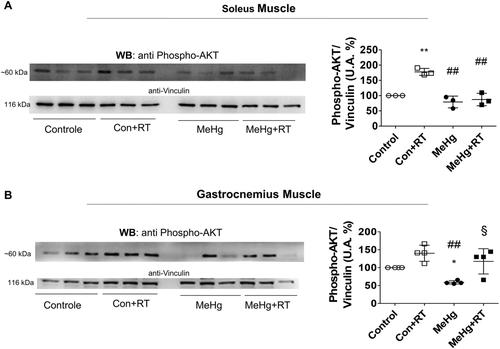This study investigated the effects of methylmercury intoxication on mice skeletal muscle subjected or not to progressive resistance training (RT).
Four experimental groups were formed. Control and Con + RT received water and methylmercury (MeHg) and MeHg + RT groups received methylmercury (5 mg/kg/day), via gavage for 14 days. The Con + RT and MeHg + RT animals performed weighted ladder climbing RT, three times a week for 4 weeks. Animal muscle strength and gastrocnemius and soleus cross-section area, fibrosis, myosin heavy chains (MyHCs), E3-ligases MAFbx and MuRF1, 20S proteasome (P20S) and LC3-II content were analysed. In addition, P20S chymotrypsin-like activity was evaluated.
Resistance training protected MeHg + RT mice against strength loss but not against muscle atrophy. The latter appeared to be associated with MyHCs significant content reductions observed in the MeHg and MeHg + RT groups. In soleus muscle, there was an increase in E3-ligases and P20S levels and P20S activity in both methylmercury groups compared with control ones. This pattern was also observed for gastrocnemius muscle, except for P20S content and activity that decreased. The P-AKT content decreased in the soleus and gastrocnemius of the MeHg animals while significant elevation of LC3-II content levels occurred.
The accumulation of methylmercury caused an increase in skeletal muscle MyHCs degradation, resulting in muscle atrophy that was reinforced by the elevated fibrosis area. Although RT did not reverse this condition, maintenance of muscle strength levels in animals submitted to MeHg + RT was detected. We believe that RT somewhat protected MeHg from damage to neural muscle structures, to be further investigated.


